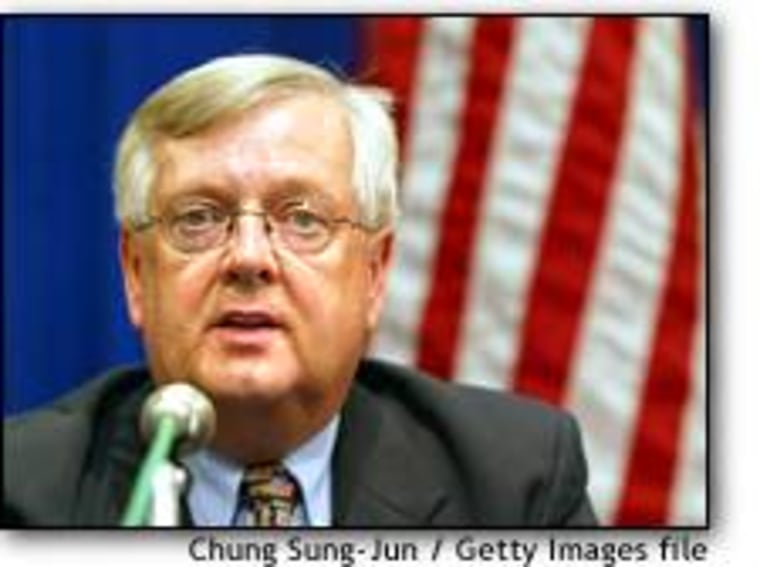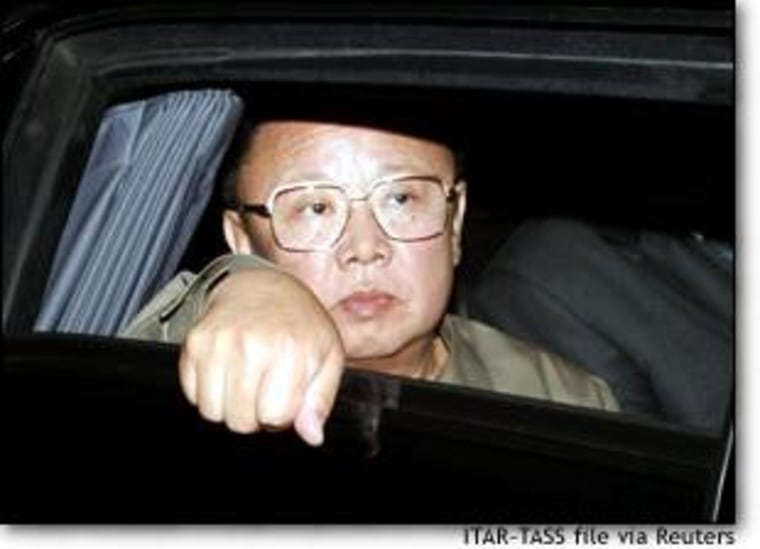American allies in Asia, including South Korea and Japan, are working with a senior Republican congressman to fine tune a plan to win North Korea’s agreement to abandon all nuclear weapons in exchange for an American pledge of non-aggression. Though the Bush administration has not signed on, senior officials are aware of the plan and view it as a possible way to break the long-standing deadlock over the North’s pursuit of nuclear weapons.
THE PROPOSED 10-point, two-stage process is the brainchild of a Republican member of Congress, Curt Weldon, who led a fact-finding trip to the North in early June and described the North Korean response as “extremely positive.” Weldon has retailed the plan to an array of top Bush administration officials since returning, including Secretary of State Colin Powell, and has been in contact with South Korean, Japanese, Chinese and Russian officials, as well.
For now, the Bush administration has disavowed the plan, at least publicly. “We’ve got no five-point, ten-point or seven and a half point plans right now,” says a State Department official on condition of anonymity. “We are continuing to consult with friends and allies on the next steps.”
Others cautioned that North Korea’s reactions are notoriously unpredictable.
“We haven’t seen any authoritative reaction from the North Korean on this yet,” says Richard Halloran, a long-time North Korea watcher. “The North Koreans haven’t shown any sign they’re ready to deal.”
A Pentagon official, who also requested anonymity, said the proposed “non-aggression pact” aspect of the Weldon plan would invariably raise objections among defense officials, but that the plan also has supporters and “appears to have some momentum behind it.”
A particularly difficult issue would be squaring a non-aggression pact with American obligations to defend Japan and South Korea under mutual self defence treaties the country has signed with both of them.
TWO PHASE, TEN POINTS
However, the plan, published for the first time here, is attracting attention in Asia and in the United Nations, where a senior aide to Secretary General Kofi Annan confirmed that the U.N. chief had read it and was working behind the scenes to move it forward.
The Weldon plan, obtained by MSNBC.com, would be implemented in two parts. In the first year, the U.S. would sign a one year “non-aggression pact” to North Korea, recognize the Pyongyang government and offer economic assistance in tandem with South Korea and Japan. In exchange, the North would be required to completely renounce nuclear weapons development, give a full inventory of nuclear facilities and accede to inspections by an agency to be designated by Washington of all such locations. North Korea would also be obliged to rejoin the Nuclear Non-Proliferation Treaty, which it withdrew from last year.

The second phase of the plan would begin immediately after the first year “or the agreed upon time frame and satisfactory completion of the inspection” of the North’s facilities. The U.S.-North Korea non-aggression pact would become permanent, the North would agree to sign the Missile Technology Control Regime, a treaty that prohibits trade in ballistic technologies, agree to observer status in the Helsinki Human Rights Commission and set a timeframe for improvements in its abysmal record on that count. The U.S. and its Asian allies also would open new avenues of cooperation and investment in North Korean agriculture, education, energy and other realms.
NUCLEAR NITPICKING
The Bush administration has struggled to influence North Korea ever since taking office and moved quickly in 2001 to distance itself from the 1994 “Agreed Framework” deal signed by the Clinton administration, which gave the North food, oil and help building a proliferation-safe nuclear power reactor in exchange for abandoning its efforts to produce a plutonium-based weapon.
The deal stumbled on, however, until last October, when U.S. officials say that the North admitted to a previously undetected bomb program based on enriched uranium.
Since then, tensions have risen and fallen, but never really eased significantly. The Bush administration recently has been trying to get North Korea to agree to new talks, but only under multilateral auspices. Earlier this month, at the Group of Eight economic summit in France, President Bush reiterated that the United States would only listen to North Korean concerns if they are raised at multilateral meeting including China, Russia, Japan and South Korea.
The North so far has rejected that formula, countering with a proposal that bilateral U.S.-North Korean talks be held in some kind of multilateral setting. The U.S. rejected that because, as the State Department official said Tuesday, “this is not just something between the U.S. and North Korea. In our view, this is a problem that’s got to be dealt with multilaterally, and we’re waiting for a response.
Weldon says he and many others in Congress are out of patience with this approach.
“To get hung up over some stupid exercise about who sits where at the table is just crazy,” he says. “We’re talking about nuclear war here, and I’ve received the briefings. It would be costly, not only to us and the South Korean military, but for civilians.”
HAWKS AND HAWKS
Weldon, who is generally considered a hawk on defense and foreign policy issues, says he supports President Bush’s foreign policy and sees the Iraq war as having put the United States in a stronger position for dealing with North Korea. Weldon says he fears that “hawks” on North Korea within the administration are convinced that the U.S. can use economic embargoes to cause the regime there to collapse, and he cites long-term embargo policy failures in Iraq and Cuba as cautionary warnings.
But the administration has argued that the North has to choose its fate and Washington refuses to rule out preemptive action — something Weldon’s plan would offer, at least temporarily.
Richard Armitage, the second-ranking official at the State Department, told a Tokyo roundtable discussion last week that North Korea had reached “a fork in the road.”
“When you come to a fork in the road you have to take one or the other, so we’ll see which they take. I think they’re trying to decide.”
